David couldn’t understand it. All of these things belonged in his world, not this one. They were tokens and souvenirs of a life not unlike his own. He read further, and came to a series of diary entries. Most of them were very short, describing days at school, trips to the seaside, even the discovery of a particularly large and hairy spider in a garden web. The tone of them changed as they went on, the entries growing longer and more detailed, but also bitter and angry. They spoke of the arrival of a little girl, a potential sister, into a family, and of a boy’s rage at the attention being paid to the new arrival. There was regret, and nostalgia for a time when it had been just “me and my mummy and daddy.” David felt a kinship with the boy, but also a dislike for him. His anger at the girl, and at his parents for bringing her into his world, was so intense that it veered into pure hatred.
“I would do anything to be rid of her,” read one entry. “I would give away all of my toys, and every book that I ever owned. I would give up my savings. I would sweep the floors every day for the rest of my life. I would sell my soul if she would just GO AWAY!!!!”
But the final entry was the shortest of them all. It said simply: “I have decided. I will do it.”
Glued to the last page was a photograph of a family, its four members standing beside a vase of flowers in a photographic studio. There was a father with a bald head and a pretty mother wearing a white dress decorated with lace. At her feet sat a boy dressed in a sailor suit, who scowled at the camera as though the photographer had just said something nasty to him. Beside him, David could just make out the hem of a dress and a pair of small black shoes, but the rest of the girl’s image had been scraped away.
David turned back to the very first page of the book and saw what was written there. It read:
Jonathan Tulvey. His Book.
David closed the book with a snap and hastily stepped away from it. Jonathan Tulvey: Rose’s great-uncle who had disappeared along with his little adopted sister and had never been seen again. This was Jonathan’s book, a relic of his life. He remembered the old king, and the loving way in which he had touched the book.
“The book has value to me.”
Jonathan was the king. He had made a bargain with the Crooked Man, and in return he had become the ruler of this land. Perhaps he had even passed through the same portal that David had used to come here. But what was the arrangement, and what had happened to the little girl? Whatever bargain he had made with the Crooked Man had cost him dearly in the end. The old king, pleading to be allowed to die, was living proof of this.
A sound came from above. David shrank back against the wall as the figure of a guard appeared on the gallery, resuming his position now that the chamber was empty once again. There was no way David could get back to his room without being seen. He looked around and tried to find another way out. He could take the doorway the king had used, but that would almost certainly mean being confronted by guards. There was also the tapestry on the wall behind the throne. Somehow, the Crooked Man had found a way out through there, and David doubted that there would be guards where the Crooked Man had gone. David was also curious. For the first time, he felt that he knew more than the Crooked Man or the king thought he knew. It was time to try to use that knowledge.
Silently, he made his way to the tapestry and lifted it back from the wall. Behind it was a door. David pushed down on the door handle, and it opened without a sound. Beyond lay a low-ceilinged passageway, lit by candles set in alcoves in the stonework. The roof of the passage was so low that it almost touched David’s hair as he entered. He closed the door behind him and followed the passageway down, down, deep into the cold, dark places that lay beneath the castle. He passed disused dungeons, some still littered with bones, and a chamber that was filled with instruments of pain and torture: racks upon which to stretch prisoners until they screamed; thumbscrews with which to break their bones; spikes and spears and blades to pierce the flesh; and, in a far corner, an iron maiden, shaped like the mummies’ coffins that David had seen in museums but with nails set into its lid so that anyone placed inside would face an agonizing death. It made David feel queasy, and he passed through the chamber as quickly as he could.
At last he came to an enormous room dominated by a great hourglass. Each bulb of the glass was as tall as a house, but the top bulb was almost empty. The wood and glass from which the hourglass had been constructed looked very old. Time, for someone or something, was draining away, and now it was almost gone.
Beside the hourglass room was a small chamber furnished with a simple bed, a stained mattress, and an old blanket resting upon it. On the wall across from the bed was an array of bladed weapons, daggers and swords and knives, all arranged in descending order of length. Another wall held a shelf covered in glass jars of different shapes and sizes. One of them seemed to glow faintly.
David’s nose wrinkled at an unpleasant smell from close by. He turned to find the source and almost bumped his head against a garland of wolves’ muzzles hanging by a rope from the ceiling above, twenty or thirty in all, some still damp with blood.
“Who are you?” said a voice, and David’s heart came close to stopping from the shock of hearing it. He tried to find the source of the sound, but there was nobody there.
“Does he know you’re here?” said the voice again. It was the voice of a girl.
“I can’t see you,” said David.
“But I can see you.”
“Where are you?”
“I’m over here, on the shelf.”
David followed the sound of the voice to the shelf of jars. There, in a green jar close to the edge, he saw a tiny little girl. Her hair was long and blond, and her eyes were blue. She shone with a pale light, and wore a simple white nightdress. There was a hole in the gown at her left breast, with a large chocolate-colored stain around it.
“You shouldn’t be here,” said the little girl. “If he finds you, he’ll hurt you, just like he hurt me.”
“What did he do to you?” asked David.
But the little girl only shook her head and clenched her lips tightly, as though trying not to cry.
“What’s your name?” asked David, trying to change the subject.
“My name is Anna,” said the little girl.
Anna.
“I’m David. How can I get you out of there?”
“You can’t,” said the girl. “You see, I’m dead.”
David leaned in a little closer to the jar. He could see the girl’s small hands touching against the glass, but they left no fingerprints upon it. Her face was white and her lips were purple, and dark rings surrounded her eyes. The hole in her nightdress was clearer now, and David thought that the stains surrounding it might be dried blood.
“How long have you been here?” he said.
“I’ve lost count of the years,” she said. “I was very young when I came here. There was another little boy in this room when I arrived. I dream of him sometimes. He was like I am now, but he was very frail. He faded away when I was brought to this room, and I never saw him again. I’ve been growing weak, though. I’m afraid. I’m scared that what happened to him is going to happen to me. I’ll disappear, and then no one will ever know what became of me.”
She began to cry, but no tears fell, for the dead can no longer weep or bleed.
David placed his little finger against the jar, just where the girl’s hand was touching it from the inside, so that only the glass separated them.
“Does anyone else know that you’re here?” asked David.
Читать дальше












